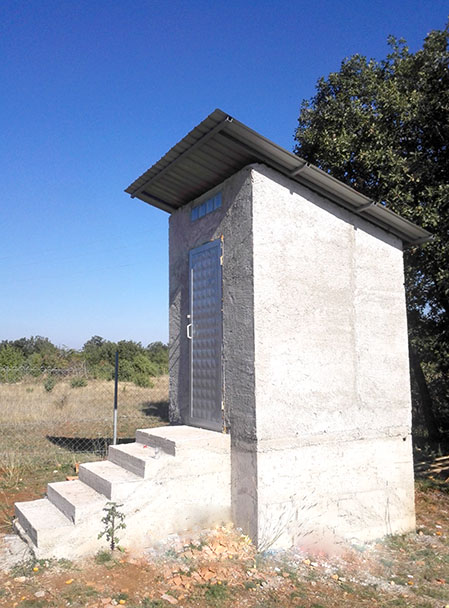Ekosan toilets and the separation of urine and faeces are not a new idea. The human body is discarding urine and faeces separately. Within the project: Dry toilets – Reduction of chemicals and contamination of drinking water sources in rural areas in Macedonia, Bosnia and Herzegovina and Albania building of three toilets is planned. At the kick-off meeting held in Munich, Germany from 10-11. 06. 2015 members of NGOs Eco Forum from Bosnia, Women in Development from Albania and Journalists for Human Rights from Macedonia were introduced to the basic principles of ekosan toilets. The host WECF who is a partner in the project, presented examples and practices from countries that use ekosan. At the first meeting in Munich the dynamics of the project was agreed, the timetable and a compulsory study visit to Moldova. (Although these toilets are used also in Sweden, Denmark, Germany, etc.).
After research and choosing a site for construction of the ekosan toilet, the visit to Moldova followed. JHR representative Filip Spirovski and Gjulten Zendeli from the Institute for Public Health from Skopje had three days to get acquainted with the best practices in using ekosan. In Moldova, the homes in rural areas have more than 200 ekosan toilets and about thirty in schools and public institutions.
The advantages of these toilets compared to pit latrines are numerous: no soil pollution, no danger of contamination of drinking water sources, no odor, no wasting of water. If we know that the human body on average produces 50 kg of faeces and 500 liters urine per year, and for this the flush toilets spend 12,000 liters of water, then wastage of water is evident. It is important to emphasize the use of urine and faeces in agriculture (in the gardens). Urine is rich in nitrogen (53%) and diluted and properly treated can be used as fertilizer. Faeces from these toilets is treated by drying. The purpose of drying is to destroy pathogens and parasites. This is done by aplying ashes or sawdust or other dry material (sand, soil etc). After a treatment period of a year faeces is a suitable fertilizer for agriculture. The negative side of using ekosan is the need for occasional technical manipulation of urine and faeces that should be done cautiously to avoid contamination and undesirable consequences.

Realizing the advantages of ecosan JHR, NGO which is implementing the project in Macedonia, begun construction of the toilet in the village Jabolci, municipality of Sopiste, 25 km from Skopje. With the support of the municipality two workshops were held to introduce the project. Special emphasis was given to composting. The reasons were explained why these toilets are useful for countries like Macedonia, which has 95% coverage of the territory with clean water.
The construction of the toilet was realized with technical and expert assistance of Mr. Sergiu Andreev of Moldova, Ms. Claudia Wendland from Germany, Ms. Bistra Mihaylova from Bulgaria, Mr. Zlatan Alibegovic from Bosnia and Ms. Azra Kadic NGO Eco Forum Zenica from Bosnia, Ms Fiorella Plani from NGO Women in Development – Shkodra, Albania, and construction company “Flower” from Skopje.
For the construction of the toilet were used 150 bricks 16x20x40; 150 full bricks 6x12x20; 30x50kg bags of cement, 10m3 of sand; 3mx2m reinforcement mesh; nails; wooden formwork; tin and iron for the roof; 3 tin doors for the storage; a tin door 800x2000mm for the toilet.
Completion of works in the village Jabolci, where the ekosan toilet is located, is planned by March 2017 with the construction of the garden, planting trees, fencing a composting site and marking a demonstration treatment plant for sludge. This way Skopje and Macedonia will get another place for environmental education.




 Македонски
Македонски